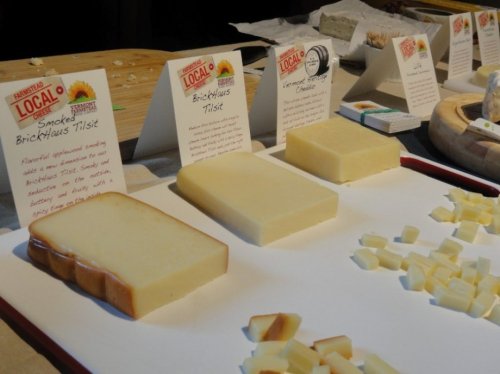
International Business Times August 25 2014
US cheesemakers raise stink over geographic labeling restriction proposals
By Connor Adams Sheets
Gouda, muenster and cheddar cheese are staples at delis and restaurants from New York to Vancouver. But if the final version of a cross-Atlantic trade agreement released earlier this month is approved, Canada will include them on a list of 173 food and beverage products barred from being sold under their common names unless they are produced in Canada or in the European regions for which they are named or commonly associated.
The battle over so-called “geographical indications" has been fought around the globe for much of the past decade as food and beverage producers in Europe have sought greater protection for their iconic foods and drinks.
"Geographical indications" is the concept that drove a 2005 agreement between the United States and the EU regarding wine labeling. The pact mandated any sparkling wines labeled “Champagne” and sold in the U.S. must be made using grapes grown in France’s Champagne region though it did allow companies that were already producing sparkling wine before the agreement was signed to continue to do so.
A version of this concept is at play in the nearly decade-long discussions over a controversial part of the proposed Comprehensive Economic and Trade Agreement, or CETA, a free trade agreement between Canada and the 28 EU member states expected to remove 98 percent of bilateral trade tariffs.
Expected to be finalized as soon as next month and to be instituted no sooner than a year from now, Politico reported, the proposal would break down many trade barriers between the two entities. But many food producers in the U.S. and other countries have balked at its provisions concerning geographical indications — sometimes referred to as GIs — which would require adding a modifier like “imitation” or “fake” to the packaging of some products.
Although this accord would be limited to products sold in Canada, food industry observers are playing close attention: It could affect a wider-reaching agreement currently at the center of hot international debate. The Transatlantic Trade and Investment Partnership, which has been under negotiation for the past year, would establish new free-trade policies between the U.S. and the EU and could include geographical indication provisions.
More than 50 U.S. senators signed a letter last spring urging the Department of Agriculture to fight such provisions in deals with the EU, responding to concerns from industry stakeholders. Jaime Castaneda, a senior vice president at both the National Milk Producer Federation and the U.S. Dairy Export Council and executive director of the international Consortium for Common Food Names, says the dairy and cheese industries support geographical indications, but not for products that have been produced for many decades in countries around the world.
“We obviously reject [being] limited in selling any of those names that have been already in the public domain,” he said. “We are not against GIs, we believe GIs are a legit way of certifying a product and producers can use that all over the world; there’s no problem with that. But we have a significant problem when a country wants to tackle the right to a name that has been used in some cases for centuries.”
Jennifer Lynn Bice, owner of Redwood Hill Farm & Creamery in Sebastopol, California, told the San Francisco Chronicle she believes adding GI rules along the lines of those included in CETA would confuse buyers and, ultimately, lead to lower sales. “Consumers are going to have a hard time determining which cheeses are what,” she said.
The EU is pursuing the accord with Canada at a time when it is having difficulty generating economic growth in countries like Greece and Italy. The institution of a new geographic indication regime would boost some economies in those nations by giving their products an advantage over competitors.
“Feta or Asiago — those two cheeses for instance — were produced in Canada for many, many, many years and imported from other countries,” Castaneda said, but if CETA is approved, “producers from Canada and the EU would be able to call it Feta in Canada but the United States and other countries would have to call it ’feta style.’ The question is ’why?’”
But the Canadian government sees CETA as a potential boon for its economy as it would provide new opportunities for trade with the EU and save millions of dollars in tariffs.
“This is another important step toward the implementation of the historic Canada-EU trade agreement, which will create jobs and opportunities for hard-working Canadians in every region of the country,” Canadian Trade Minister Ed Fast said in a YouTube announcement earlier this month, later calling it “by far Canada’s most ambitious and comprehensive trade agreement,” and one that will “boost the Canadian economy by $12 billion annually.”
The finalized text of CETA is being translated into 23 languages to be looked over by lawyers and released to the European and Canadian public to review.